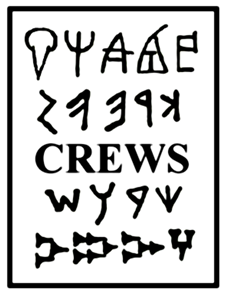
Contexts of and Relations between Early Writing Systems (CREWS) is a European Research Council funded project based in the Faculty of Classics. Beginning in April 2016, it will run for five years, until 2021.
The project
The aim of the CREWS project is to take an innovative and interdisciplinary approach to the history of writing, developing new methodologies for studying writing systems and their social context. The project researchers will be working on specific case studies relating to inscriptions of the ancient Aegean, Eastern Mediterranean and Levant (c.2000-600 BC). By looking at the ways in which writing systems were developed and used, we can study not only the systems themselves and the languages written in them, but also the cultural settings in which they were adapted and maintained.
Two central research questions underpin the project:
1) How can we tell how different writing systems are related to each other?
and
2) What effect does the social context in which it is used have on writing?
By focusing on the Mediterranean in 2nd and 1st millennia BC, the project will be able to investigate writing during a period when we know there were high levels of contact between different areas. Against this backdrop of linguistic and cultural interconnections, a study of how writing was passed on and adapted for new uses has the potential to give new insights into social history.
Writing systems under investigation
- The Aegean scripts: Cretan Hieroglyphic, Linear A and Linear B
- Ugaritic cuneiform (and its relationship with other cuneiform systems such as Akkadian)
- The Phoenician ‘alphabet’ or ‘abjad’ (and its relationship with other systems such as the Aramaic and Hebrew alphabets)
- The Greek alphabet (and its development from the Phoenician system and relationships with other early alphabets in e.g. Anatolia and Italy)
Find out more
You can find out more about the researchers working on the CREWS project by visiting our ‘members’ page.
To follow the project’s progress, visit the CREWS blog at https://crewsproject.wordpress.com/.

